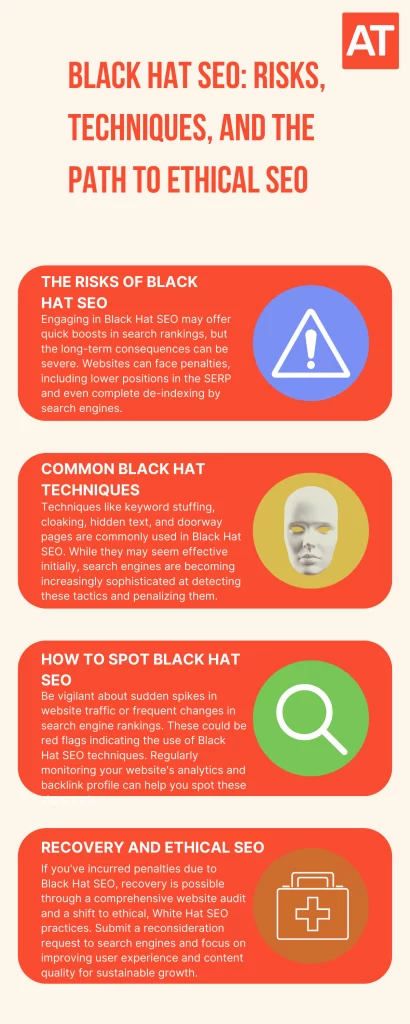Do you find it fascinating when websites suddenly appear at the top of search engine results before disappearing just as quickly? The secret often lies in the controversial practice known as Black Hat SEO.
Securing a spot on the first page of search engine results is similar to discovering a gold mine in the digital world. But beware, not all that glitters is gold. Enter Black Hat SEO is a risky strategy that might offer immediate rewards but can have devastating consequences for your search engine rankings.
Black Hat SEO might seem like a shortcut to success, but it’s a risky game that can cost you in the long run.
Table of Contents
ToggleWhat is Black Hat SEO?
If you’ve ever stumbled upon a webpage filled with nonsensical text that seems to repeat the exact keywords repeatedly, you’ve likely encountered a classic example of Black Hat search engine optimization. This divisive SEO strategy seeks to deceive search engines into giving a website a higher rating than it merits.
Black Hat vs. White Hat SEO
So, what’s the difference between Black Hat and White Hat SEO? While White Hat SEO focuses on improving your website’s visibility through ethical means like quality content and user experience, Black Hat search engine optimization employs tactics that violate search engine guidelines. These could range from keyword stuffing to cloaking and even using link farms.
White Hat SEO and Black Hat SEO are like the Yin and Yang of search engine optimization. One focuses on long-term success, while the other seeks quick, often unsustainable, gains.
The Risks of Using Black Hat SEO
While the allure of quick search engine rankings might tempt you to dabble in this practice, it’s crucial to understand the risks involved. Search engines like Google have sophisticated algorithms and human review processes to detect and penalize such practices.
Penalties and SERP Ranking
If caught using Black Hat SEO tactics, you could face severe penalties that significantly affect your search engine results page (SERP) rankings. These penalties can range from temporary ranking drops to complete de-indexing of your website.
User Experience
Another downside is the negative impact on user experience. Visitors are likely to leave your site if they encounter keyword-stuffed content or deceptive cloaking, which ultimately hurts your site’s reputation and authority.
I once consulted for a company that was unaware their SEO expert was using Black Hat SEO techniques. When they were hit with a Google penalty, their organic traffic plummeted by 70%. It was a hard lesson on the importance of ethical SEO practices.
Common Black Hat SEO Techniques
People use techniques in Black Hat SEO to manipulate search engine rankings. While they may quickly boost search rankings, these methods are frowned upon and can lead to severe penalties. Here are some of the most commonly used Black Hat SEO techniques:
Keyword Stuffing
This involves overloading your content with keywords in an unnatural way. While it may initially improve your search ranking, search engines like Google are increasingly adept at identifying and penalizing this practice.
Cloaking
Search engines and people are exposed to alternate material using cloaking. If you do not follow the search engine guidelines, they may remove your website from the search results. It is important to avoid engaging in this unethical practice.
Hidden Text
Some websites use text the same color as the background, effectively hiding it from users but not search engines. The search engines punish this because it is regarded as a Black Hat SEO tactic.
Doorway Pages
These are web pages created solely for search engines and provide little value to users. They usually redirect users to a different page and are considered a violation of search engine guidelines.
Article Spinning and Duplicate Content
Creating slightly altered versions of the same article or using software to spin articles is another frowned-upon technique. Original, quality content is what search engines and users value.
So, always prioritize quality over quantity. Black Hat SEO tactics like keyword stuffing and cloaking might hurt your website more than help it.
JC Penney employed black hat SEO tactics during the 2010 holiday season to rank well for various search terms. The New York Times investigation revealed that thousands of unrelated retail websites linked to JCPenny.com using precise keywords, indicating a well-planned black hat strategy.
JC Penney terminated the SEO company working for them because of the incident, and their website likely received penalties, such as being removed from Google’s search database.
The Middle Ground: Understanding Grey Hat SEO
What is Grey Hat SEO?
Grey Hat SEO occupies the ethical grey area between White Hat and Black Hat SEO. While not explicitly against search engine guidelines, these tactics are often considered ethically dubious and could put your website at risk over time.
Grey Hat SEO might offer short-term gains, but it’s a risky strategy that could lead to penalties. Always weigh the risks and rewards.
Common Grey Hat Techniques
- Clickbait Titles: Crafting sensational headlines to attract clicks.
- Social Media Automation: Using bots to automate social media actions.
- Aggressive Link Building: Acquiring backlinks in ways that aren’t entirely natural.
Risks and Rewards
While Grey Hat SEO may offer quicker results than White Hat techniques, it’s not without risks. Search engine algorithms constantly update, meaning they can turn today’s grey areas into tomorrow’s blacklisted practices.
Ethical Considerations
The ethical implications of Grey Hat SEO are up for debate. While not explicitly against the rules, these tactics can sometimes border on manipulation, making it crucial to consider the long-term impact on your website’s reputation.
When Anfinit Technologies consulted for a client who had previously employed Grey Hat SEO, we noticed a significant drop in rankings after a Google algorithm update. Transitioning to White Hat SEO recovered the rankings and improved user engagement.
Transitioning to White Hat SEO
Consider transitioning to a more sustainable, ethical SEO strategy if you’re currently using Grey Hat techniques. White Hat SEO may take longer to show results, but it’s a safer, more reliable approach that aligns with search engine guidelines.
Transitioning to White Hat SEO is like switching to a long-term investment. It may take time to mature, but the returns are more stable and less risky.
How to Identify Black Hat SEO Practices
If you’re working with an SEO agency or managing your SEO, it’s crucial to be vigilant about the techniques used. Here’s how to spot Black Hat SEO practices:
Sudden Spike in Traffic
While a sudden increase in website traffic might seem reasonable, it could be a red flag if you haven’t made significant changes to your SEO strategy.
Frequent Changes in Search Rankings
Using Black Hat SEO techniques could be why your website’s search engine rankings constantly fluctuate.
Unnatural Backlinks
Check your website’s backlink profile. If you notice an influx of low-quality or irrelevant backlinks, Black Hat SEO tactics like link farms are likely being used.
Keyword Overload
If your content suddenly seems stuffed with keywords or if you notice hidden text, these are telltale signs of Black Hat SEO.
Audit Your SEO Agency
If you’re working with an SEO agency, don’t hesitate to ask for a detailed report of their techniques. Transparency is vital; a reputable agency will have no issues sharing this information.
Always keep an eye on your website’s analytics and backlink profile. Any sudden changes could be a sign of Black Hat SEO at work.
Identifying Black Hat SEO early can save you from severe penalties and loss of reputation. Regular monitoring and audits are your best defense.
Recovering from Black Hat SEO Penalties
If you’ve fallen into the trap of Black Hat search engine optimization and are facing penalties, don’t lose hope. Recovery is possible but requires immediate action and a shift towards ethical SEO practices.
Audit Your Website
The first step is to conduct a comprehensive website audit to identify the Black Hat search engine optimization techniques that led to the penalty. Remove any hidden text, keyword-stuffed content, or shady backlinks.
Submit a Reconsideration Request
Once you’ve cleaned up your website, submit a reconsideration request to search engines like Google. This is your chance to explain what went wrong and the steps you’ve taken to correct it.
Focus on User Experience
Switch your focus from tricking search engines to providing value to your users. High-quality content and a good user experience are the cornerstones of White Hat SEO.
Monitor and Update
Regularly monitor your website’s performance and update your SEO practices. It might take time, but your search engine rankings will eventually recover.
Switching from Black Hat to White Hat SEO is like turning a new leaf. Although it takes time and work, the outcomes are worthwhile.
At Anfinit Technologies, we helped a client recover from a severe Google penalty. It took six months of diligent White Hat SEO practices, but their traffic and rankings are now better than ever.
Conclusion: The Path Forward with Ethical SEO
Search engine optimization can be hard to navigate, but one thing is sure: Black Hat SEO is an unsafe activity. While it may offer short-term gains, the long-term consequences can devastate your website’s visibility and reputation.
Instead, concentrate on White Hat SEO strategies that respect search engine guidelines and promote the user experience. Doing so will build a sustainable, trustworthy online presence that stands the test of time.
Why Choose Anfinit Technologies?
If you seek expert guidance on ethical SEO practices, Anfinit Technologies is here to help. With our experience and expertise, we can help you build an effective, penalty-free SEO strategy that delivers results.
Ethical SEO is a long-term investment that pays off. Don’t gamble your website’s future on quick fixes that could lead to penalties.









This Post Has 2 Comments
Pingback: Importance of SEO: Why it Matters for Your Business - Anfinit Technologies
Pingback: How to Choose the Best SEO Company for Your Business - Anfinit Technologies